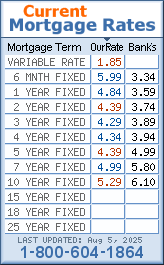|
| | Canadian Real Estate / Mortgage Glossary : C| Results found: 167 | Page: 1 of 9 |
Call Option
A clause in a mortgage that gives the lender the right to request the balance at any time.
|
Canada Deposit Insurance Corporation (CDIC)
A crown corporation that provides deposit insurance against the loss of deposits made with member financial institutions.
Click here to visit website.
|
Canada Education Savings Grant
Program recently introduced by the federal government whereby it will invest, in the form of grants, along-side parents who save for their children's education through RESPs. The government will top up contributions made to an RESP by 20% up to a yearly maximum of $400 per beneficiary.
|
Canada Savings Bonds (CSBs)
A secure way for Canadians to save. The bonds, which are a form of debt issued by the Canadian government, are cashable, with proper identification, at any time at most Canadian financial institutions.
|
Canadian Bankers Association (CBA)
Professional industry association that provides information, research, advocacy, education and operational support services primarily to the banking industry.
Click here to visit website.
|
Canadian Depository for Securities Limited (CDS)
Agency responsible for the automatic processing and clearing of all securities transactions in Canada.
Click here to visit website.
|
Canadian Payments Association (CPA)
This association, which is composed of several financial institutions and the Bank of Canada, operates a national clearing system for financial institution payments.
Click here to visit website.
|
Cancellation Clause
A provision in a lease or other contract that spells out under what conditions the parties can call off the deal.
|
Cap
The top limit on the amount the interest rate can increase during a single time period of an adjustable-rate mortgage. Every ARM has two caps: a periodic cap, which limits the periodic changes to the interest allowed in the loan agreement, and a lifetime cap, which governs the total increase that can be imposed during the life of the loan.
|
Capital
Money that is used to make money; for example, to buy rental property or a business.
|
Capital Adequacy Ratio
A ratio of total capital divided by risk-weighted assets and risk-weighted off-balance sheet items. A bank is expected to meet a minimum capital ratio of 8.0% unless a higher ratio has been specifically prescribed by the Superintendent of Financial Institutions.
|
Capital Asset
An item that you own for investment or personal purposes, such as stocks, bonds or stamp collections. When you sell a capital asset, depending on the price you earn a capital gain or a capital loss. Gains are taxed at a special rate, and losses can be used in many cases to reduce the amount that is taxed. See also "Capital Gain" or "Capital Loss."
|
Capital Expenditure
The cost of making an improvement to a property.
|
Capital Gain Distribution
You receive capital gain distributions when the fund sells some of its assets and then passes along a portion to you. This distribution that you get is regarded by the IRS as a capital gain, not as ordinary dividends such as the interest you get from your bank account. It is important to separate capital gain distributions from ordinary dividends because capital gains are taxed more favourably. See also "Ordinary Dividends."
|
Capital Gain or Loss
The difference between the price you paid for an investment and the price at which you sell (in other words, the profit or loss you make). Investments that earn capital gains or losses include equity and growth funds.
|
Capital Gains
The profit that an owner makes when selling real estate or other capital asset. Capital gains receive more favourable tax treatment than regular income. Depending on your tax bracket and on how long you held an asset before selling it, you may pay about one-third to one-half less tax than you would have paid on the same amount if you had earned it as salary. See also "Capital Asset."
|
Capital Gains Tax
A tax on profits from the sale of real estate or investments.
|
Capital Improvement
Any permanent structure or other asset added to a property that adds to its value.
|
Capital Investments
Money used to purchase permanent fixed assets for a business, such as machinery, land or buildings as opposed to day-to-day operating expenses.
|
Capital Loss
When you sell an asset for less than you paid for it, or less than its adjusted basis, you have a capital loss. While it's never fun to lose money, when it comes to taxes a capital loss isn't necessarily all bad. You can reduce the amount of income that will be taxed by the amount of your loss, up to $3,000 per year. If your loss is more than that, you can carry the excess, known as capital loss carryover, forward indefinitely until the total loss is used.
|
|

|


